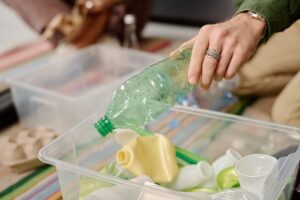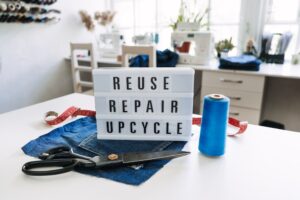Plastic is everywhere. It’s in our homes, our workplaces, our oceans, and even in our bodies. It’s cheap, convenient, and ubiquitous, but it’s also one of the biggest environmental problems we face today. Plastic waste is filling our landfills and oceans, leaching toxins into our soil and water, and harming wildlife. But we don’t have to live with this problem. There are many sustainable alternatives to plastic that are just as convenient, cost-effective, and even stylish.
Sustainable Alternatives to Single-Use Plastic
One of the biggest culprits of plastic waste is single-use items like water bottles, straws, and grocery bags. Fortunately, there are many sustainable alternatives that can help reduce waste and save you money in the long run.
Reusable water bottles and drinkware
Instead of buying plastic water bottles, invest in reusable water bottles made from stainless steel or glass. These can be refilled again and again, and many brands offer insulated options to keep your drinks hot or cold for hours. Similarly, reusable coffee cups and travel mugs are a great way to reduce waste while enjoying your favorite beverages on the go.
Reusable grocery bags and produce bags
Plastic grocery bags are one of the most common types of litter, and they can take hundreds of years to decompose. Reusable grocery bags made from durable materials like canvas, nylon, or recycled plastic can be used again and again, saving money and reducing waste. Similarly, reusable produce bags made from mesh or cloth can be used instead of the thin plastic bags often provided in grocery stores.
Beeswax wraps
Instead of using plastic wrap to keep your food fresh, try using beeswax wraps. These are made from cotton fabric coated with beeswax, jojoba oil, and resin, which creates a natural seal around your food. They can be washed and reused for up to a year, and they are biodegradable at the end of their lifespan.
Bamboo utensils and stainless steel straws
Plastic utensils and straws are major waste sources, but many sustainable alternatives are available. Bamboo utensils are lightweight, durable, and biodegradable, making them a great option for picnics or takeout meals. Stainless steel straws can be used instead of plastic straws, and they come with cleaning brushes to keep them hygienic.
Sustainable Alternatives for Plastic in the Home
Plastic is often used in household items like food storage containers, trash bags, and even toys. Fortunately, there are many sustainable alternatives available that can reduce waste and improve your home’s environmental footprint.
Glass or stainless steel food storage containers
Instead of using plastic containers to store your food, try using glass or stainless steel. These materials are non-toxic, durable, and can be used for years without degrading. They are also easy to clean and can be used in the microwave or oven.
Biodegradable trash bags
Instead of using plastic trash bags that can take hundreds of years to decompose, try using biodegradable bags made from plant-based materials like cornstarch or sugarcane. These bags break down much faster than plastic and can be composted along with your other organic waste.
Compostable plates and cutlery
If you’re hosting a party or event, consider using compostable plates and cutlery instead of plastic. These are often made from cornstarch or sugarcane and can be composted along with your food waste. They are a great way to reduce waste and create a more sustainable event.
Sustainable Alternatives for Personal Care
Plastic is also often used in personal care items like shampoo bottles, toothbrushes, and feminine hygiene products. Fortunately, there are many sustainable alternatives available that can help reduce waste and promote healthier living.
Refillable shampoo and soap bars
Instead of using plastic bottles of shampoo and soap, try using refillable bars. These are often made from natural ingredients and come in a variety of scents and styles. Refillable bars are also cost-effective, as they can last for months and often come with packaging made from recycled materials.
Bamboo toothbrushes
Plastic toothbrushes are a major source of waste, as they are often discarded after only a few months of use. Bamboo toothbrushes, on the other hand, are biodegradable and made from sustainable materials. They are also available in a variety of styles and bristle types, making them a great option for anyone looking to reduce their environmental impact.
Menstrual cups and reusable pads
Disposable feminine hygiene products like pads and tampons generate a significant amount of waste each year. Menstrual cups and reusable pads are a great alternative, as they can be used for years and are often made from natural materials. They are also more cost-effective in the long run, as they can be washed and reused for months at a time.
Sustainable Alternatives in Fashion and Accessories
Plastic is often used in fashion and accessories, but there are many sustainable alternatives available that can reduce waste and promote ethical production practices.
Recycled plastic bags and accessories
Instead of using new plastic bags or accessories, try using products made from recycled plastic. These can be anything from bags to jewelry and are often made from recycled bottles or other materials. They are a great way to reduce waste and create a more sustainable fashion industry.
Clothing made from sustainable materials
Many clothing brands now offer products made from sustainable materials like organic cotton, linen, or recycled polyester. These materials are often more durable and environmentally friendly than traditional materials, and they are a great option for anyone looking to reduce their environmental impact.
Sustainable and ethical jewelry
Many jewelry brands now offer products made from sustainable and ethical materials like recycled metals and natural gemstones. These products are often made with fair labor practices and can help reduce the environmental impact of the jewelry industry.
Final thoughts
Plastic waste is a major environmental problem, but there are many sustainable alternatives available that can help reduce waste and promote healthier living. From reusable water bottles and beeswax wraps to bamboo toothbrushes and sustainable fashion, there are many ways to say goodbye to plastic and create a more sustainable lifestyle. By making small changes in our daily lives, we can all make a big impact on the environment and create a more sustainable future.









Reader Interactions